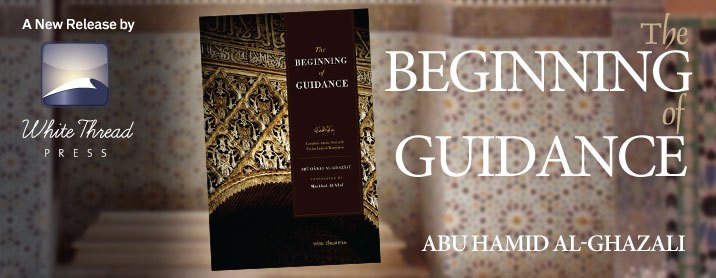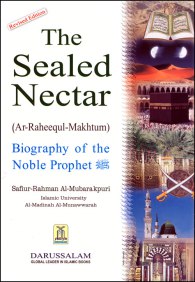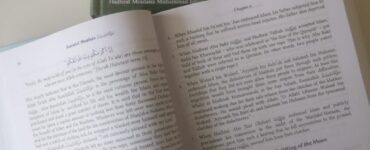Title: The Beginning of Guidance – Bidāyah al-Hidāyah
Author: Imām Abū Hāmid al-Ghazālī (May Allāh have mercy on him)
Translator: Dr. Mashhad al-Allaf
Publisher: White Thread Press
About the Book
Originally in Arabic, Imām Ghazālī’s ‘Beginning of Guidance’ was written after the Ihyā Ulūm al-Dīn (Revival of The Religious Sciences) which in itself is a phenomenal work and has been granted immense Qabūliyyah (divine acceptance). Imām Ghazālī condensed this major work which consists of 4/5 volumes and has summarised it all in ‘The Beginning of Guidance’. Throughout the book, he writes ‘If you would like to learn more about this, refer to the Ihyā’ or ‘Refer to the Ihyā for a deeper discussion on this topic.’
Imām Ghazālī wrote this book after being requested to by his student. His student requested that he write a short work on spiritual knowledge and how to practice and maintain the spiritual connection with Allāh.
The ‘Beginning of Guidance’ can be classed as an introduction to the Ihyā, at the same time it is also a very comprehensive primer on Tasawwuf as it encompasses its different aspects. It touches upon; ‘ibādah (worship), ādāb (etiquette) and the different sins which are perpetrated by the various different body parts. This book is a manual to understand the āyah (verse) “And I did not create the Jinn and Mankind except that they worship me” (51:56). The students of Dīn have vast libraries of book written for them however this particular book is for the worshippers. Imām Ghazālī outlines in the book how a typical worshipper should spend their daily lives and stresses the point that the thought of Allāh should never leave a worshipper’s mind. The worshippers mind and heart should always be occupied with the remembrance of Allāh.
My Thoughts
As per habit, Imām Ghazālī never ceases to amaze. Each topic he covers adequately while keeping to moderation. Without delving too deep into a topic, each chapter is so eloquently put forward that it leaves the reader in awe. The English translation as well as the Arabic. It was due to this sheer eloquence and rhetoric that Muftī Dr Abdur Rahmān Mangera (the head of White Thread Press) decided to include the original Arabic text on the side so that the readers who understand Arabic can also enjoy the fluency of Imām Ghazālī.
Another aspect of the book which makes the book a great read is that it is written as though Imām Ghazālī himself is speaking to each and every reader. This opens up the doors to Imām Ghazālī’s world and lets the reader understand his level of thought and level of cognition. It is as though Imām Ghazālī is the Shaykh and the reader is his spiritual disciple. The method of describing each different action which is done daily is truly unique and can only be appreciated when practised upon.
The section of the book which stood out and impressed me the most was, Imām Ghazālī briefly described towards the end of the book the manner of composing oneself in social situations. A common problem is that many of us consider ourselves to be pious and so do others, however we lack basic social etiquette and do not know how to act amongst the creation. The narration mentions that the second most weightiest deed on the day of judgment will be good character.
If there was one thing to change, it would be to do with the publishing/translation. It would be good if the Arabic text of the different Du’ās are either highlighted, made bold or included above the translation so that the layman who does not understand Arabic can easily find it instead of trying to decipher the Arabic text on the side.
Publishing
White Thread Press books are always of high quality and standard (MāshāAllāh). The typeset, paper quality, binding, cover design and layout of all their books are exceptional. I would not hesitate to give them each a 10/10. Although the price may be a little high for some readers, it is definitely worth it. Their books make the reading experience a 100 times more enjoyable. (May Allāh accept Muftī Mangera’s and WTP’s efforts and give them the ability to carry on such an immense work with ease.)
Dr Mashhad al-Allaf has translated the book after reading various other translations of it and corrected all of their mistakes. Which were mainly mistakes pertaining to the numbering of the Qur’anic verses, the prophetic narrations and mistakes related to the language of the jurists. The translation is accurate and flows. I commend Dr Mashhad on the translation of this great work and I pray Allāh accepts it in his court. I pray Allāh makes this work a means of his salvation.
Imām Ghazālī, being a Shāfi’ī in jurisprudence, has included various rulings which stem from his Shāfi’ī school of thought. A Hanafī, Mālikī or Hanbalī reading this book should be aware of this and should not confuse the rulings in the book for the ruling of their respective school. The translator (Dr Mashhad) however has done an excellent job by outlining this throughout the book when necessary alongside various other explanatory notes.
Closing Comments
I would highly recommend that this is the next book on the reading list of ALL. I highly recommend that all laymen/students and scholars purchase this book if not done so already. The book is a river of wisdom captured between two covers. It is a spiritual booster pack, and gives a more spiritual twist to knowledge. Imām Ghazālī presents knowledge in such a way that everything read can be put into practice. For verily only that knowledge is beneficial which results in practise, because our purpose in life is worship and practice.
May Allāh overlook any shortcomings and accept.
Please inform me if any errors have slipped in.
JazākAllāh Khair for reading!
Hanzala Khān






